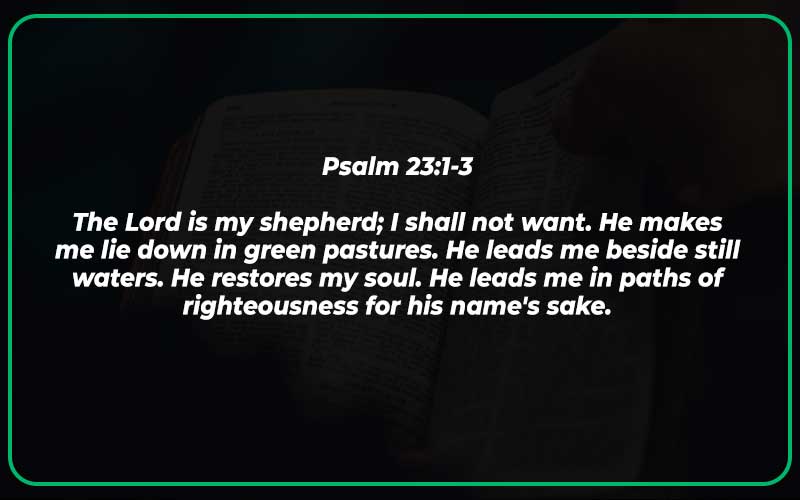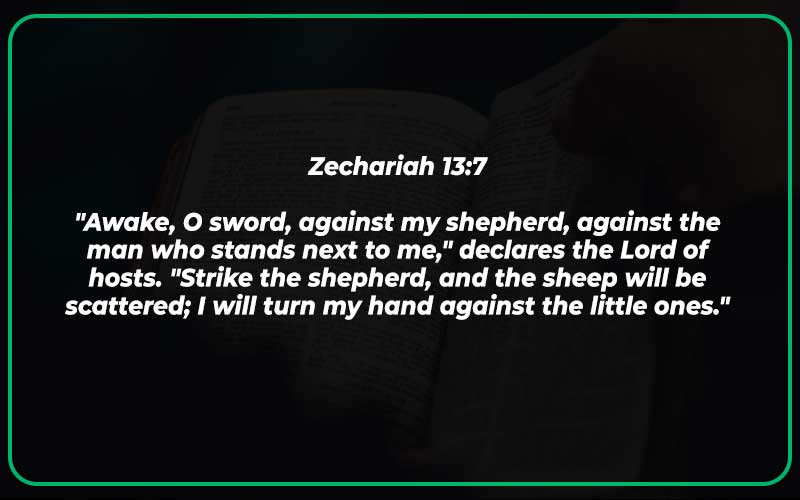Life without guidance and direction can leave us feeling lost and vulnerable, like sheep without a shepherd. But we have a compassionate Shepherd who guides, protects, and leads us on the right path.
In this blog post, we will explore comforting Bible verses that highlight the tender care of our Good Shepherd. Discover the peace, provision, and security that come from surrendering to His guidance. Get ready to find solace and renewed purpose as we allow the Good Shepherd to lead us through life’s challenges.
Also Read: Bible Verses About Manhood
Bible Verses About Sheep Without a Shepherd
Matthew 9:36
When he saw the crowds, he had compassion for them, because they were harassed and helpless, like sheep without a shepherd.
Jesus was moved with compassion when he saw the crowds of people who were wandering aimlessly without direction or leadership, just like sheep without a shepherd. He recognized their need for guidance and care, and was compelled to provide for them both spiritually and physically.
Mark 6:34
When he went ashore he saw a great crowd, and he had compassion on them, because they were like sheep without a shepherd. And he began to teach them many things.
Jesus once again saw the crowd of people as sheep without a shepherd and felt compassion for them. He responded by teaching them many things, providing direction and guidance for their lives. Jesus recognizes the importance of a loving leader who provides wise counsel for his sheep.
Isaiah 53:6
All we like sheep have gone astray; we have turned—every one—to his own way; and the Lord has laid on him the iniquity of us all.
Isaiah uses the metaphor of sheep to describe humanity’s natural inclination to wander away from God and follow our own desires. Without a shepherd to guide and protect us, we are led astray by our own selfishness. But God, in his mercy, has laid our iniquity on Jesus, the Good Shepherd who laid down his life for his sheep.
Jeremiah 50:6
“My people have been lost sheep. Their shepherds have led them astray and have wandered off. They have deserted them.
Jeremiah laments the spiritual condition of God’s people, describing them as lost sheep. He attributes their condition to their leaders, who have failed to guide them with wisdom and compassion. In this verse, Jeremiah acknowledges the important role of a shepherd in protecting and leading his flock.
Zechariah 10:2
For the household gods utter nonsense, and the diviners see lies; they tell false dreams and give empty consolation. Therefore the people wander like sheep; they are afflicted for lack of a shepherd.
Zechariah is warning against the false prophets and idolaters who lead people astray with their empty promises and false teachings. Without a true shepherd to guide them, the people are left wandering aimlessly and suffering from spiritual affliction. Zechariah calls for a return to the true Shepherd who can provide the guidance and comfort they need.
Psalm 23:1-3
The Lord is my shepherd; I shall not want. He makes me lie down in green pastures. He leads me beside still waters. He restores my soul. He leads me in paths of righteousness for his name’s sake.
The most famous Psalm describes God as our loving shepherd, providing for our every need and guiding us on righteous paths. With him as our shepherd, we will lack nothing and be able to rest in green pastures. His guidance refreshes our soul and restores us to a right relationship with him.

John 10:11-14
“I am the good shepherd. The good shepherd lays down his life for the sheep. He who is a hired hand and not a shepherd, who does not own the sheep, sees the wolf coming and leaves the sheep and flees, and the wolf snatches them and scatters them. He flees because he is a hired hand and cares nothing for the sheep. I am the good shepherd. I know my own and my own know me.”
Jesus identifies himself as the good shepherd who lays down his life for his sheep. Unlike a hired hand who abandons the sheep in danger, Jesus cares deeply for his flock and is willing to sacrifice himself to protect and guide them. He has a personal relationship with each of his sheep, knowing them intimately and leading them in the way they should go.
Ezekiel 34:11-16
“For thus says the Lord God: Behold, I, I myself will search for my sheep and will seek them out. As a shepherd seeks out his flock when he is among his sheep that have been scattered, so will I seek out my sheep, and I will rescue them from all places where they have been scattered on a day of clouds and thick darkness. And I will bring them out from the peoples and gather them from the countries, and will bring them into their own land. And I will feed them on the mountains of Israel, by the ravines, and in all the inhabited places of the country. I will feed them with good pasture, and on the mountain heights of Israel shall be their grazing land. There they shall lie down in good grazing land, and on rich pasture they shall feed on the mountains of Israel. I myself will be the shepherd of my sheep, and I myself will make them lie down, declares the Lord God.”
Ezekiel prophesies of God’s commitment to his people, as he searches for and gathers his sheep who have been scattered and lost. As a loving shepherd, he will provide for their physical and spiritual needs, leading them to green pastures and providing safety and security. He promises to be their personal shepherd, guiding them back to their true home and leading them in obedience to his commands.
1 Peter 5:2-4
Shepherd the flock of God that is among you, exercising oversight, not under compulsion, but willingly, as God would have you; not for shameful gain, but eagerly; not domineering over those in your charge, but being examples to the flock. And when the chief Shepherd appears, you will receive the unfading crown of glory.
Peter exhorts the leaders of the church to be shepherds, caring for and guiding the flock of God under their care. He instructs them to lead and serve willingly and eagerly, giving of themselves without desire for personal gain or control. In doing so, they will honor the true Chief Shepherd and receive the ultimate reward of a crown of glory.
Psalm 119:176
I have gone astray like a lost sheep; seek your servant, for I do not forget your commandments.
The psalmist acknowledges their own tendency to wander and get lost like a sheep without a shepherd. But rather than despair, they remember the steadfast love and guidance of God, and cry out for him to seek and rescue them. They place their hope in God’s commandments, knowing that following them will lead them back to the safety of their shepherd’s flock.
Jeremiah 23:1-4
“Woe to the shepherds who destroy and scatter the sheep of my pasture!” declares the Lord. Therefore thus says the Lord, the God of Israel, concerning the shepherds who care for my people: “You have scattered my flock and have driven them away, and you have not attended to them. Behold, I will attend to you for your evil deeds, declares the Lord. Then I will gather the remnant of my flock out of all the countries where I have driven them, and I will bring them back to their fold, and they shall be fruitful and multiply.”
Jeremiah, like Ezekiel, denounces the false shepherds who have led the people of God astray and caused them to scatter. He declares that the Lord himself will intervene and gather his faithful flock from their scattered state, bringing them back to the safety of his fold. He promises his faithful care and provision for his people, and warns the shepherds that they will be held accountable for their failure to care for their flock.
Psalm 79:13
But we your people, the sheep of your pasture, will give thanks to you forever; from generation to generation we will recount your praise.
The psalmist recognizes that God’s people are like sheep in his care, and offers thanks and praise for his faithful love and provision. They recognize their dependence on the Good Shepherd, and vow to continue to give thanks and share his praises from generation to generation.
Zechariah 13:7
“Awake, O sword, against my shepherd, against the man who stands next to me,” declares the Lord of hosts. “Strike the shepherd, and the sheep will be scattered; I will turn my hand against the little ones.”
Zechariah prophesies of the coming of the Good Shepherd, who will ultimately be struck down for the sake of his sheep. Despite the scattering of his flock, however, God will not abandon them, but will instead turn his hand against their oppressors and bring his people back into his fold.

What Does the Bible Say About Sheep Without a Shepherd?
In the Bible, the metaphor of “sheep without a shepherd” is used to depict people who are lost, vulnerable, and in need of guidance and leadership. The concept is often associated with the compassionate care and guidance provided by a shepherd to his flock of sheep. When the Bible refers to people as “sheep without a shepherd,” it emphasizes their helplessness, lack of direction, and the potential dangers they face without proper guidance.
The phrase appears multiple times in the Old and New Testaments, illustrating the concern God has for His people and the responsibility of leaders to care for and guide them. It is also reflective of humanity’s need for a higher authority and a spiritual leader to follow.
One prominent example in the New Testament is in the book of Matthew (Matthew 9:36), where it states: “When he saw the crowds, he had compassion on them because they were confused and helpless, like sheep without a shepherd.”
In the context of the Bible, this metaphor serves as a reminder of our dependence on God’s wisdom and guidance, as well as the significance of responsible and caring leadership in guiding communities and individuals towards righteousness and protection. It also highlights the loving and compassionate nature of God, who seeks to guide and protect His people like a devoted shepherd cares for his flock.

